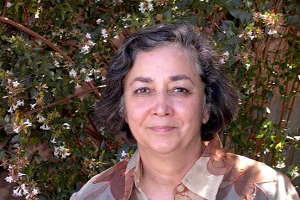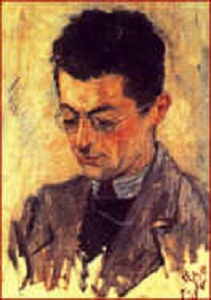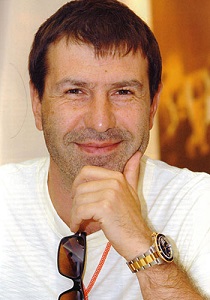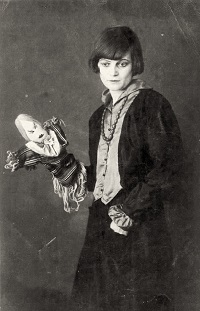De Iraanse schrijfster Shahrnush Parsipur werd geboren op 17 februari 1946 in Teheran. Zie ook alle tags voor Shahrnush Parsipur op dit blog.
Uit: Touba and the Meaning of Night (Vertaald door Kamran Talattof and Havva Houshmand)
“Haji Adib thought about the women, “They can think.” Something had been shaken in him again, just as the first time he had seen the globe. Haji Adib thought, “Very well, you know that the earth is round, you knew it very well. But then why so much anxiety?” This knowledge threw him rapidly into depths of thought. In his studies he had read that some of the Greek philosophers had hypothesized the roundness of the earth. He knew that the scientists of the east also had knowledge of this fact. At least, a few of them knew it. Then Galileo had come and proven it. Haji Adib knew all of this, yet he wanted to continue believing in the squareness of the earth.
He sat on the edge of the octagonal pool and leaned his head on his left arm. He needed to understand why he wanted the earth to remain square. Impatiently, he wanted to throw aside any thought of the sleeping lady earth. But the thought would not leave him, spinning in the sphere of his mind…. Who was it who said that slaves were merely tools that spoke? Haji Adib had at last found a thought to keep him from dwelling on the sleeping lady of the earth. Who said it? Perhaps it was a Roman. He raised his eyebrows, but it would not come to him. He could not remember.
Who was it who had said, “Let us shut the books and return to the school of nature?” Again, his memory failed him. What had been the use of all his reading, he thought.
On the ground, ants were coming and going in a straight line. Haji Adib placed his index finger in the way of one of the ants. The ant stopped, shook his antennae, then climbed up his finger. Now that the earth was round, everything took on a different meaning. The ant walked aimlessly up and down Haji Adib’s finger. Without doubt, Rumi had been right: Nature progressed, ascended, and was always becoming. But did an ant think? Perhaps it had some kind of thought process. Not everything could be Haji Adib’s sole possession, particularly thought.”

Shahrnush Parsipur (Teheran, 17 februari 1946)
De Iraanse schrijver Sadegh Hedayat werd geboren op 17 februari 1903 in Teheran. Zie ook alle tags voor Sadegh Hedayat op dit blog.
Uit: The Elixir of Life (Vertaald door Kambiz Parsai)
„The sons said: “Most obediently dear father!”; and prepared to leave. Readily,the cobbler gave each a loaf of bread and a jug of water and kissed them goodbye.
The three brothers began their journey. As long as their eyes could see and there was some strength in their knees, they went forth. Exhausted to death, they finally reached a crossroads. They spotted an elm tree there and sat under its shade to take some rest. Ahmadak was so tired that he immediately fell into a deep slumber. The elder brothers who were always very jealous of him and indeed nourished a thirst for his blood, began to contemplate the removing of this ever-present obstacle on their way. They voiced to each other the fear that Ahmadak would one day emerge as a formidable challenge and a big headache. They said: “We’d better get rid of him now!” They jumped on him, tied his hands behind him, dragged him to a nearby deep and dark cave and threw him there. Ahmadak`s pleas remained unheard. The more he begged them for mercy, the less they listened to him. To make things still more difficult for him, the pitiless brothers closed the entrance of the cave with stone. They had already taken Ahmadak`s shirt with them and stained it with the blood of a dove they killed. They gave the shirt to the leader of a passing caravan imploring him to show it to their cobbler father back home and inform him that Ahmadak had been devoured by a wolf. They then continued their way forth until they reached a forked-road. There they cast lots and one went eastward and the other went westward.”

Sadegh Hedayat (17 februari 1903 – 9 april 1951)
De Chinese schrijver Mo Yan werd geboren op 17 februari 1955 in Gaomi in de provincie Shandong. Zie ook alle tags voor Mo Yan op dit blog.
Uit: Shifu, You’ll Do Anything for a Laugh (Vertaald door Howard Goldbaltt)
“He parked his bike and took a look around, exchanging a meaningful glance with old Qin Tou, the gateman. Then, with a heavy sigh, he slowly walked over to join the crowd. His heart was heavy, but not too heavy. After word of imminent layoffs at the factory had gotten out, he went to see the factory manager, a refined middle-aged man, who graciously invited him to sit on the light-green lambskin sofa. Then he asked his secretary to bring them tea. As Ding held the glass of scalding liquid and smelled its jasmine fragrance, he was engulfed in gratitude, and suddenly found himself tongue-tied. After smoothing out his high-quality suit and sitting up straight on the opposite sofa, the factory manager said with a little laugh:
“Ding Shifu, I know why you’re here. After several years of financial setbacks here at the factory, layoffs have become unavoidable. But you’re a veteran worker, a provincial model worker, a shifu — master worker — and even if we’re down to the last man, that man will be you.”
People were crowding up to the bulletin board, and from his vantage point behind them, Ding Shikou caught a glimpse of three large sheets of paper filled with writing. Over the past few decades, his name had appeared on that bulletin board several times a year, and always on red paper; those were the times he had been honored as an advanced or model worker. He tried to elbow his way up front, but was jostled so badly by the youngsters that he wound up moving backward. Amid all the curses and grumbling, a woman burst out crying. He knew at once it was Wang Dalan, the warehouse storekeeper. She’d started out as a punch-press operator, but had mangled one of her hands in an accident, and when gangrene set in they’d had to amputate it to save her life. Since it was a job-related injury, the factory kept her on as a storekeeper”.

Mo Yan (Gaomi, 17 februari 1955)
De Russische schrijver, regisseur en acteur Yevgeni Grishkovetz werd geboren op 17 februari 1969 in Kemerovo. Zie ook alle tags voor Yevgeni Grishkovetz op dit blog.
Uit: Rivers (Vertaald doorAdrienne Celt)
“Only once did I see a bear outside of a zoo. Only one time in my whole life. Even though I was born in Siberia, and lived my first thirty-odd years there. In Siberia, where once upon a time my great-grandfather was born and died, where my grandfather was born and died, and where my father too was born. I ran away from Siberia. Ran far and, I’d dare say, remorselessly.
I was born and raised in a city that now seems neither big nor small to me. I somehow can’t call its true measurements to mind. Sometimes it looms incomprehensibly large, but when I left, it was stifling and claustrophobic. And now even when I return — ra-a-rely, rarely — return to that city of my birth, I don’t know what I’m looking at. It’s big or small for those who live there. And I’m one of those who left. I left and now I can’t understand it. Never.
My mind no longer contains the mechanism to understand the city, and perhaps more importantly, I’m not completely convinced that I need to understand it. How’s that for a problem?
This is why, when I’m oh-so-far from the city where I was born and raised, and farther still from my Mother Country, I fall into some strange practices… Imagine: heat, the very end of July. The South. And not just our south, but the true South. Grasshoppers sing in the dry grass, and everything else rings with the immobilizing heat. The sky is cloudless, the horizon burning white hot, and you stand before some kind of attraction, something distinguished among all these ruins.A guide drones on about the historical significance of the place, right where you’re standing, and someone from your group, someone like you, the pedantic people in shockingly bright shorts, asks some probing question to show off their own intelligence. Your vision is starting to blur, when your guide leads you onward, and you enter some cave or tomb, and its dark coolness falls over you, it seems almost damp, but not unpleasantly damp, restoringly so.“

Yevgeni Grishkovetz (Kemerovo, 17 februari 1969)
De Duitse schrijver Frederik Hetmann (eig. Hans-Christian Kirsch) werd geboren op 17 februari 1934 in Breslau. Zie ook alle tags voor Frederik Hetmann op dit blog.
Uit: Geräusch der Grille – Geräusch des Geldes
„Eines Tages verließ ein Indianer die Reservation und besuchte einen weißen Mann, mit dem er befreundet war.
In einer Stadt zu sein, mit all dem Lärm, den Autos und den vielen Menschen um sich -‘all dies war ganz neuartig und auch ein wenig verwirrend für den Indianer.
Die beiden Männer gingen die Straße entlang, als plötzlich der Indianer seinem Freund auf die Schulter tippte und ruhig sagte: “Bleib einmal stehen. Hörst du auch, was ich höre?”.
Der weiße Freund des roten Mannes horchte, lächelte und sagte dann: “Alles, was ich höre, ist das Hupen der Autos und das Rattern der Omnibusse. Und dann freilich auch die Stimmen und die Schritte der vielen Menschen. Was hörst du denn?”
“Ich höre ganz in der Nähe eine Grille zirpen”, antwortete der Indianer.
Wieder horchte der weiße Mann. Er schüttelte den Kopf.
“Du musst dich täuschen”, meinte er dann, “hier gibt es keine Grillen. Und selbst wenn es hier irgendwo eine Grille gäbe, würde man doch ihr Zirpen bei dem Lärm, den die Autos machen, nicht hören.”
Der Indianer ging ein paar Schritte. Vor einer Hauswand blieb er stehen. Wilder Wein rankte an der Mauer. Er schob die Blätter auseinander, und da – sehr zum Erstaunen des weißen Mannes – saß tatsächlich eine Grille, die laut zirpte.“

Frederik Hetmann (17 februari 1934 – 1 juni 2006)
De Duitse dichteres, schrijfster en caberetiere Emmy Hennings werd geboren op 17 februari 1885 in Flensburg. Zie ook alle tags voor Emmy Hennings op dit blog.
Morpheine
We wait for one last adventure
What does the sunshine care for us?
Days piled high collapse
Restless nights – prayer in purgatory.
Then too, we do not read the daily mail
Only sometimes we smile quietly in the pillows,
Because we know everything, and cannily
Fly hither and thither in fever chill.
Though people scurry and strive
Today the rain still falls drearily
We drive through life without stopping
And sleep, perplexed, thereafter…
Vertaald door Howard A. Landman
An die Scheiben schlägt der Regen
An die Scheiben schlägt der Regen.
Eine Blume leuchtet rot.
Kühle Luft weht mir entgegen.
Wach ich, oder bin ich tot?
Eine Welt liegt weit, ganz weit,
Eine Uhr schlägt langsam vier.
Und ich weiß von keiner Zeit,
In die Arme fall ich dir …

Emmy Hennings (17 februari 1885 – 10 augustus 1948)
Hier met een van haar Dada poppen, 1917
Zie voor nog meer schrijvers van de 17e februari ook mijn blog van 17 februari 2012 deel 2 en eveneens mijn blog van 17 februari 2011 deel 2 en eveneens deel 3.
